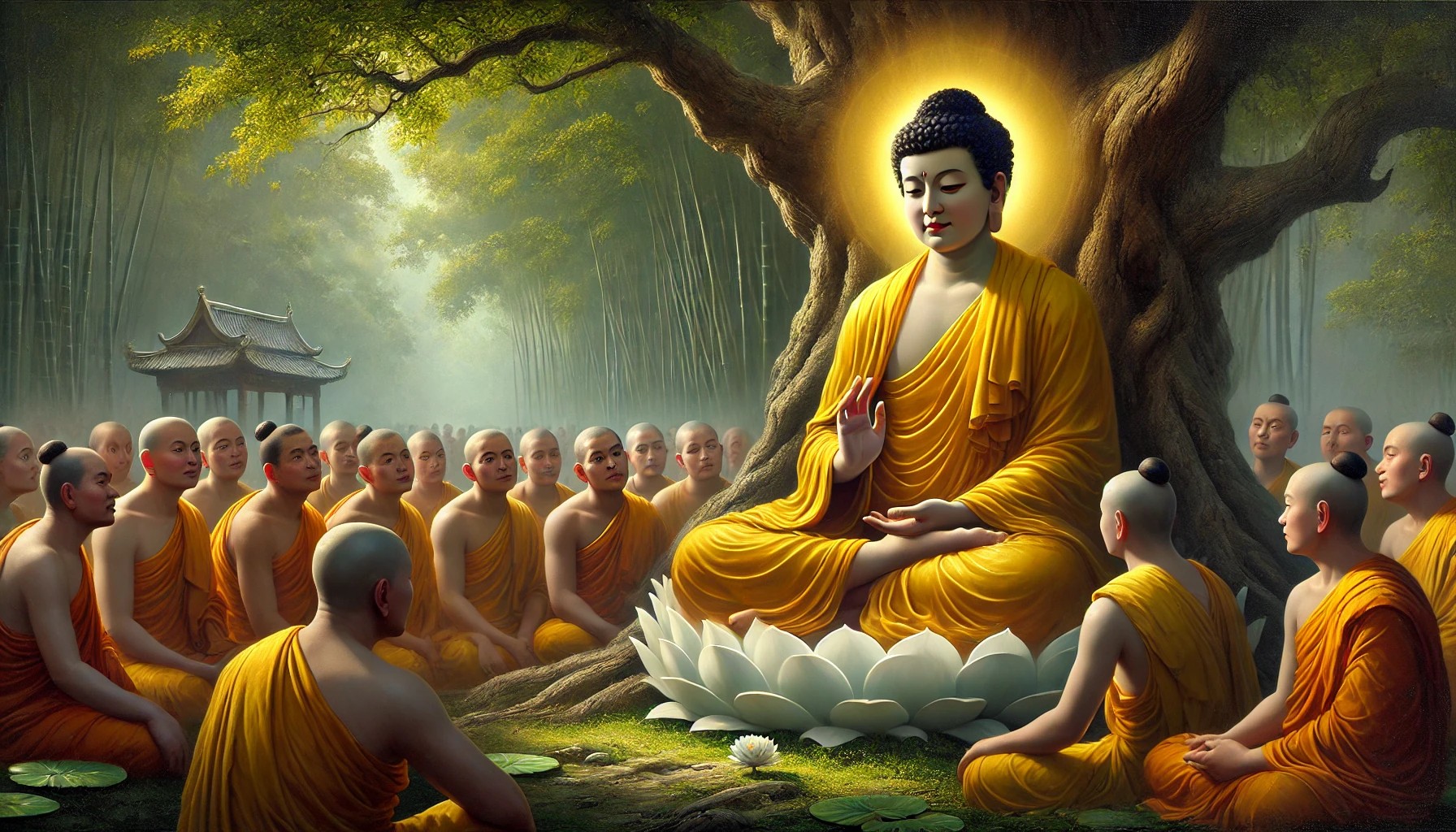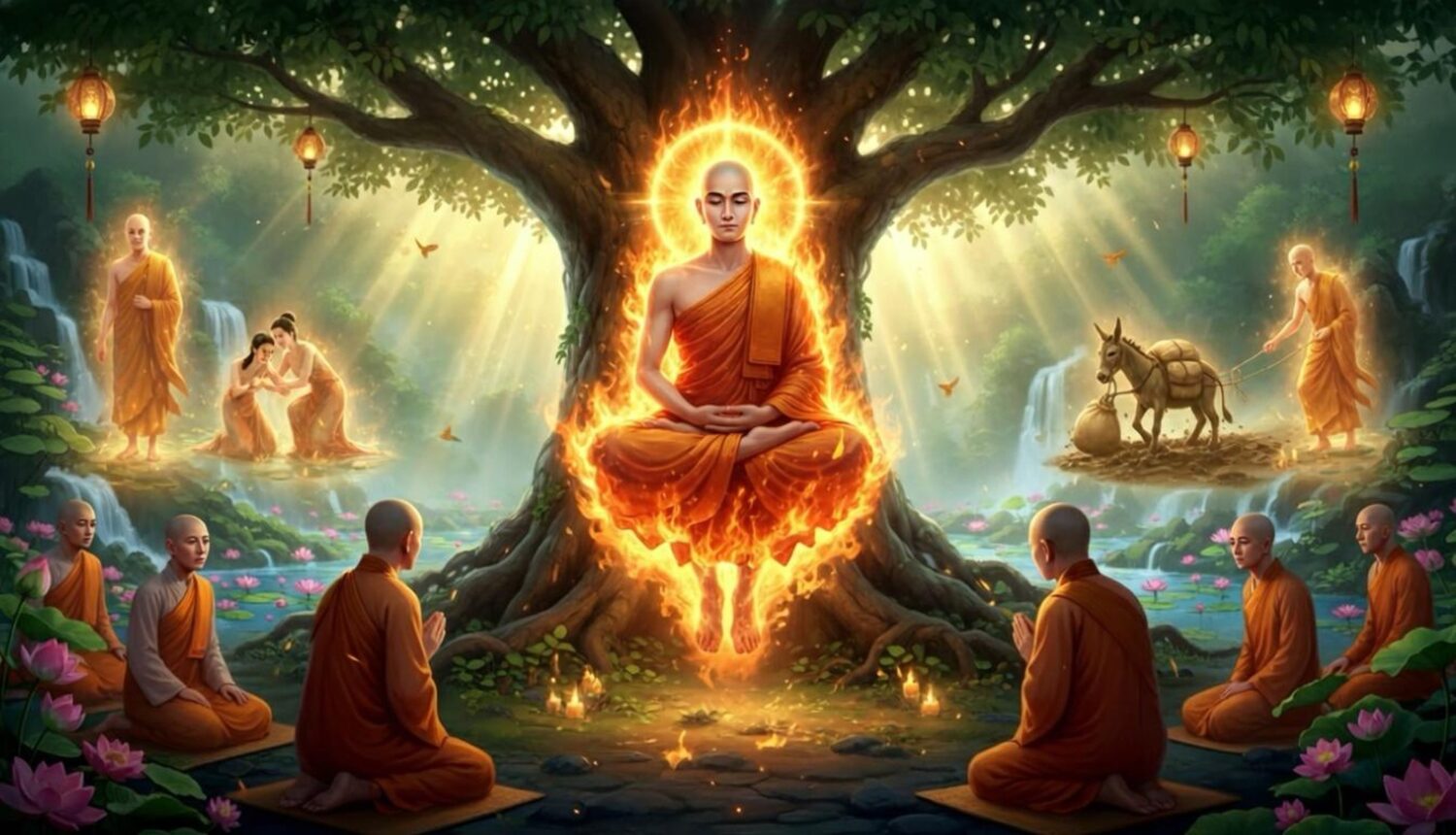
Date: 11/09/2024 11/10/2024
Location: Star Ocean Meditation Center
Teacher: Otto Huang
Dharma Talk
Complex Karma
Once, the Buddha was traveling and staying in the city of Rajagaha, in the Bamboo Grove at Kalanda. At that time, the Venerable Samiddhi was residing in a secluded hut near Shravasti.
One afternoon, a non-Buddhist renunciate named Pudali Putra visited Samiddhi to ask him a question:
”Friend Samiddhi, I once heard directly from the monk Gautama that’ actions done by the body and speech are insubstantial, only those done by the mind are real. Also, there is a type of meditation where, upon entering, one experiences no sensation.'”
”Friend Pudali Putra! The Blessed One did not say that. Do not slander the Blessed One, as it is not good to do so. The Blessed One repeatedly taught us that if one intentionally performs actions and achieves them, then the results are inevitable, either in this life or the next. However, if it’s unintentional, then results are not necessarily inevitable.”
Regarding meditation, there indeed exists a type that leads to a complete lack of sensation.”
Pudali Putra, disagreeing with Samiddhi’s explanation of karma, repeatedly debated with him. After some back and forth, Pudali Putra asked,
”Friend Samiddhi, if one performs an action intentionally and achieves it, what results will they face?”
”Friend Pudali Putra, if one intentionally commits an action and achieves it, they will undoubtedly face suffering.”
”Friend Samiddhi, how long have you been ordained under the monk Gautama?”
”Not long, only three years.”
Pudali Putra thought, “A young monk, only ordained three years, defends his teacher so steadfastly; what more could senior monks do?” Although unsatisfied with Samiddhi’s answers, he could not counter them effectively and left.
Their conversation was overheard by the Venerable Mahakaccana, who reported it to Ananda. Ananda thought it best to inform the Buddha. Upon learning the details, the Buddha said:
”Ananda, I do not recall ever meeting this non-Buddhist renunciate Pudali Putra, how could I have said those words to him? Moreover, look at monk Samiddhi, foolish and not fully understanding the matter. Pudali Putra’s questions were unclear, covering several scenarios, yet he answered them all with a single response.”
”Lord, maybe monk Samiddhi answered based on the principle that ‘all sensations are suffering’. What’s wrong with that?” Ananda defended Samiddhi.
”Look, Ananda, even you do not fully understand! Samiddhi should have answered that if one intentionally commits a meritorious action and achieves it, they will face joyous results; if they commit a suffering action, they will face suffering results; if they commit a neutral action, they will face neutral results.
Ananda, if Samiddhi had answered like this, Pudali Putra would have been convinced.
If you could hear the Tathagata’s extensive and deep explanations on karma, you would be clearer and rejoice in the Dharma.”
”Lord, now is the right time to speak, and we will remember and follow well.”
”Ananda! There are those who do not refrain from killing, stealing, sexual misconduct, lying, false views, and other such evil acts, yet they are reborn in the heavens with good retribution after death.
Some clairvoyants, upon seeing this, may firmly conclude that there are no consequences for evil deeds and adhere to this as the sole truth, but this is something I cannot agree with. I acknowledge that some who do evil may be reborn in heaven, but I do not agree that all who do evil are reborn in heaven.
This is because the Tathagata knows that those who do evil but are reborn in heaven might have exhausted their evil retribution in their current life, may have delayed repercussions for evil deeds committed in the current life, might not have exhausted the strong merits from previous lives, or may have had a moment of virtuous thought at the time of death.
There are those who abstain from killing, stealing, sexual misconduct, lying, false views, and other such evil acts, yet they are reborn in the hells with bad retribution after death.
Some clairvoyants, upon seeing this, may firmly conclude that there are no rewards for good deeds and adhere to this as the sole truth, but this is something I cannot agree with. I acknowledge that some who do good may be reborn in hell, but I do not agree that all who do good are reborn in hell.
This is because the Tathagata knows that those who do good but are reborn in hell might have exhausted their good retribution in their current life, may have delayed repercussions for good deeds committed in the current life, might not have exhausted the severe demerits from previous lives, or may have had a moment of evil thought influenced by wrong views at the time of death.
There are those who do not abstain from killing, stealing, sexual misconduct, lying, false views, and other such evil acts, and they are indeed reborn in the hells with bad retribution.
Some clairvoyants, upon seeing this, may rightfully conclude that evil deeds result in evil retribution, and this is something I can agree with, but adhering to this as the sole truth is something I cannot agree with. I agree that those who commit evil and die may be reborn in hell, but I do not agree that all who do evil are necessarily reborn in hell.
This is because the Tathagata knows that those who do evil and are reborn in hell might be so due to the evil deeds of their current life, the unexhausted evil karma from previous lives, or evil thoughts in line with wrong views at the time of death.
There are those who abstain from killing, stealing, sexual misconduct, lying, false views, and other such evil acts, and they are indeed reborn in the heavens with good retribution.
Some clairvoyants, upon seeing this, may rightfully conclude that good deeds result in good retribution, and this is something I can agree with, but adhering to this as the sole truth is something I cannot agree with. I agree that those who do good and die may be reborn in heaven, but I do not agree that all who do good are necessarily reborn in heaven.
This is because the Tathagata knows that those who do good and are reborn in heaven might be so due to the good deeds of their current life, the unexhausted merits from previous lives, or virtuous thoughts in line with right views at the time of death.”
Thus, Ananda, karma has four situations: actions that seem to have been resolved but actually have not; actions that seem unresolved but actually have been; actions that seem unresolved and actually are unresolved; and actions that seem resolved and actually are resolved.
This is like some fruits that appear ripe but are not, some that are ripe but do not appear so, some that are not ripe and appear not ripe, and some that are ripe and appear ripe.”

